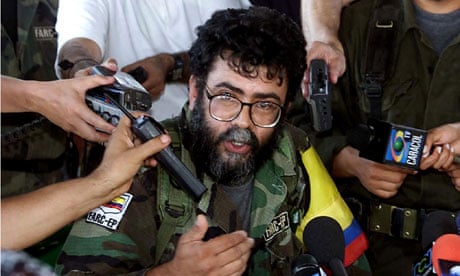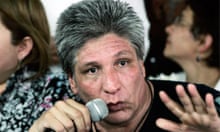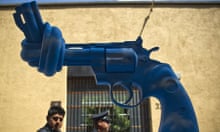Colombia's top rebel leader has been killed in a hail of gunfire near his remote camp in what the government are calling the "most resounding blow" against the guerrilla army known as the Farc in its near 50-year history.
Guillermo León Sáenz, whose nom de guerre was Alfonso Cano, was killed in combat on Friday evening after an air raid earlier in the day on his camp in a remote region of Cauca province in south-west Colombia.
Although he had shaved off his trademark full beard and moustache, and was found without the thick glasses that he always wore, Cano's body was identified through fingerprinting. Cano's general location was reportedly pinpointed several weeks ago through communication intercepts. There was a £2.5m reward on his head.
Some members of Cano's security detail, and a woman believed to be his partner, were killed in the bombing, according to the defence minister, Juan Carlos Pinzón. Cano and a handful of others hid about 200 metres from the camp, and when ground troops surrounded it, they engaged in combat. Cano was shot in the hip, the groin and the neck.
On inspecting the bombed-out camp, troops found several computers, 39 pen drives, 24 hard disks and cash in Colombian pesos, dollars and euros.
President Juan Manuel Santos and the military high command travelled to Popayán, the nearest city to the camp. On announcing the news after midnight on Friday, Santos declared Cano's death "the most resounding blow to this organisation in its entire history".
Santos seized the occasion to call on the Farc fighters to demobilise. "Otherwise you will end up in a prison or in a tomb. We will achieve peace."
Local media reported that following Cano's death, the Farc attacked a police station in Jambalo, killing a police officer. Cano is the most senior Farc leader, but his death does not mean the imminent demise of the Farc, analysts say.
"This is more a political blow to the Farc than a military one," said Ariel Avila, a conflict analyst with the Nuevo Arco Iris thinktank in Bogotá. Avila said there will probably be a new wave of demobilisations among the ranks of Farc fighters and its urban militia networks that provide logical support to the rebels. "But is this the end? Not yet."
Cano, 63, took over the Farc after the death of its legendary leader Manuel Marulanda Vélez in 2008, one of the worst years ever for the group in which it lost three members of its ruling secretariat and was duped into handing over 15 of its hostages.
But since then the Farc has regrouped and retaken the offensive, delivering deadly blows to the armed forces. Within a few days last month, 20 soldiers were killed in separate Farc attacks. Experts now estimate the Farc's strength at 9,000 fighters, about half the size it was a decade ago.
At the same time as Cano led the new Farc offensive, he made overtures to the Santos government about possible peace talks, even praising a new law to return land to victims of Colombia's conflict. Avila said Cano had managed to win consensus among the Farc leadership to seek peace talks with the government and, in a video message released in August, Cano said "dialogue is the way".
Cano's death will put the brakes, at least temporarily, on those Farc overtures and it is unclear which direction the organisation could take now.
Cano's successor will probably be Iván Márquez, or Timochenko, both of whom represent the more ideological wing of the Farc. They are believed to move along the Colombian-Venezuelan border. Another option is Joaquín Gómez, commander of the Farc's powerful, cash-rich Southern Bloc.
Santos, speaking from Popayan after congratulating the soldiers involved in the operation, said that whoever replaces Cano "will not have the same capacity for command and control". He also warned it was no time for victory speeches but rather "it is the moment to persevere".
Cano, a communist youth leader in the late 1960s, was considered a hardline Marxist. During ultimately failed peace talks from 1998 to 2002, he was in charge of the Farc's political wings, the clandestine Communist party, known as PC3, and the Bolivarian Movement.






